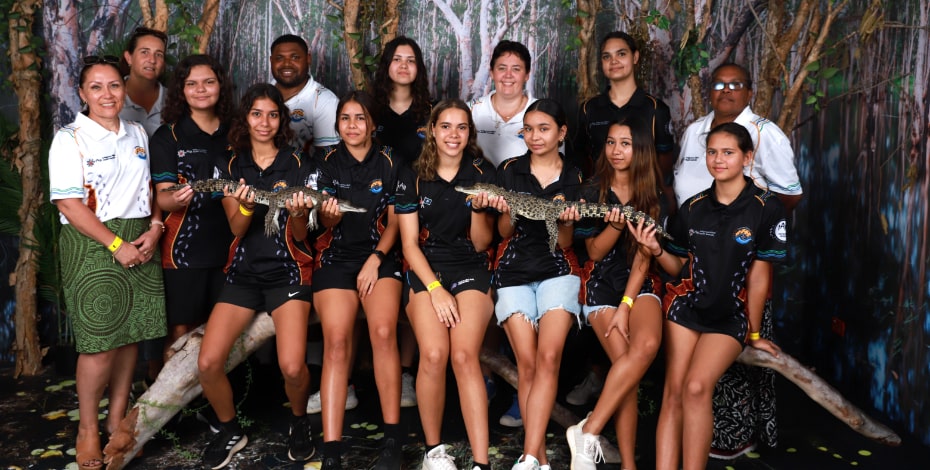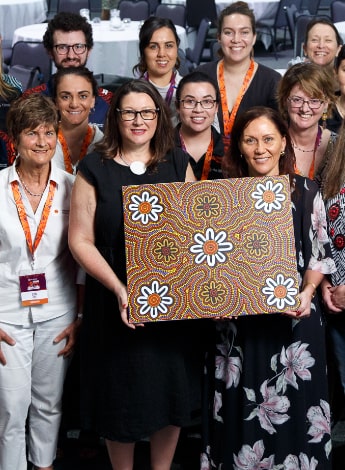
Building a path towards a brighter future

As the chief executive officer of Indigenous Allied Health Australia, Donna Murrray has been driving change for the betterment of Aboriginal and Torres Strait Islander people for more than two decades. But she explains that there is still much work that needs to be done, especially when it comes to racism in Australia.
Preparing the next generation of Aboriginal and Torres Strait Islander young people for the workforce, to take up training opportunities or to pursue further education is the mantle of Indigenous Allied Health Australia’s (IAHA) National Aboriginal and Torres Strait Islander Health Academy.
But the training pathway for Indigenous high school students from Years 10 to 12 is much more than that, says IAHA CEO Donna Murray.
It’s also a way to provide the students with social, emotional and wellbeing support on their journey.
The Health Academy operates on sites throughout Australia, and gives students experience in the health workforce with IAHA, local Aboriginal medical services, non-government organisations and government health service providers.
Through this, the students gain relevant employability skills and work readiness.
Paid employment for school-based trainees, mentoring, leadership development and career planning are part of the package, and go hand-in-hand with social, emotional and wellbeing support.
The result, Donna says, is that the pathway options for students range from gaining employment in the health or a related field to continuing study with partner organisations.
‘A majority of the time, employment for Aboriginal and Torres Strait Islander students is in the mainstream allied health environment, so it is important that we prepare them for what to expect as well as for us to work with employers and potential employers around their cultural safety,’ Donna says.
‘In the program, where the students undertake a Certificate III in Allied Health Assistance, as school-based trainees, we’ve also embedded this space for discussion around racism in health, in the workplace, and strategies, solutions, mentors, case studies and curricula that’s culturally safe for understanding the Aboriginal and Torres Strait Islander community, health and wellbeing.
'And we also educate about where these students can find the support they need.
‘The IAHA national health academy program has been developed with community and is Aboriginal-led, providing a culturally safe and responsive holistic approach to education, training and employment at the local level.
'To date, many of the graduates are the first in their family to complete Year 12, and graduates have transitioned successfully into further education and/or employment across the health and related sectors.’
This year has seen the emergence of several new academies, one of which has been set up in the northern New South Wales centre of Lismore to commence in early 2022.
That IAHA academy partners with the Northern NSW Local Health District and three local Aboriginal medical services to develop the future workforce in the region, with an aim to keep local Aboriginal and Torres Strait Islander students employed in the local health workforce in a sustainable and planned approach.
Reaching out
IAHA is the peak organisation for the Aboriginal and Torres Strait Islander allied health workforce and has a business stream called IAHA Consulting, which sits alongside the academy program.
This stream is responsible for developing cultural safety and responsiveness education and training programs for Aboriginal and Torres Strait Islander peoples and non-Indigenous Australians.
From that has come another program, cultural mentoring, which provides a culturally safe space for Aboriginal and Strait Islander people to have discussions about racism and discrimination and their impacts, as well as exploring strategies and solutions and reinforcing strengths.
‘Culture is our strength, and our identity is a strength, and it’s important to explore how we can use that in our workplace or in our environment and be recognised and respected for the value, knowledge and perspectives we bring,’ Donna says.
‘Over the years we’ve also pursued leadership development so that our Aboriginal and Torres Strait Islander members have a safe space for development, for learning new skills, but also thinking about leadership capabilities and how they can lead in their workforce or in their space or profession.
'It’s about how we can make change and how we can assert our voice and our concerns about racism.’
Racism report
There can be little doubt that the global COVID-19 pandemic has challenged many of us to think about the way we live, how we interact with one other and how we view our place in the world.
But the past two years have also highlighted another big challenge for every Australian—racism.
Every two years Reconciliation Australia conducts the national Australian Reconciliation Barometer to canvass the attitudes of Aboriginal and Torres Strait Islanders and the general community across a wide variety of topics and experiences.
By far the topic that ignites the most discussion from the biennial findings is that of racist attitudes in this country.
And so, when the 2020 Barometer showed that more Australians than ever before feel that Australia is a racist country, it was time for many in both communities to reflect on what that means and take action.
For Donna Murray, the findings that 60 per cent of Aboriginal and Torres Strait Islander respondents agree that Australia is a racist country (up from 51 per cent in 2018) and 43 per cent of respondents in the general community also agree with this statement (up from 38 per cent in 2018) are a wake-up call for everyone.
And as a Wiradjuri and Wonnarua woman, Donna says racism is something she has experienced all her life.
‘Racism is real and it exists.
'The more space we provide to have those discussions, the better.
'But equally as important are anti-racism strategies.
'What do we do about it together?’ Donna says.
‘It’s not a black problem.
'Aboriginal people are not the problem.
'And we’ve got to reflect on each and every person’s individual identity and attitudes, beliefs and perceptions for change.

The IAHA board, with Occupational Therapy Australia members at the 2019 IAHA national conference, is presented with an original painting of the IAHA logo as a gift for reconciliation and building partnerships.
'As a profession you can undertake reflective practice to do that, as individuals you can do that on yourself, owning values, dominant cultures and privilege that impact on us and find the synergy about truth telling and how we move forward.
'But racism exists, it’s real and it kills us, and there are lots of examples where racism has killed Aboriginal people in the health and justice systems.
'This is real and the evidence supports all of this, so we can’t deny it much longer.
'Transformation of non-Indigenous people’s attitudes, beliefs and assumptions will help in a small way to build cultural safety with individuals, which is critical.’
It starts with you
The creation of cultural safety is something, Donna says, that the physiotherapy profession can, and should, actively pursue to help meet targets for the employment and retention of Indigenous healthcare professionals, as well as assessing and auditing implicit bias within the profession.
She says racism has a direct impact on the health and social and emotional wellbeing of Aboriginal and Torres Strait Islander people, and presents as a barrier to accessing care as well as diminishing quality of care.
‘IAHA and the APA share membership of Aboriginal and Torres Strait Islander people.
'So whether they’re actively engaged in either or both organisations, hopefully there’s an opportunity to share information or share our Indigenous ways of doing things for the betterment of both,’ Donna says.
‘Physiotherapists play a leadership role in the profession, so it’s about thinking about the values and leadership impact you want to have as a profession on racism and in addressing racism within your profession.
‘It’s important to find dedicated spaces, whether it’s holding a yarning session or a professional development series in which you have experts come in and talk about cultural safety and addressing racism.
'There are things you can do that are quite achievable and could have a big impact if you set the expectation that this is not something that just happens around NAIDOC Week.
'It should be happening throughout the whole journey of your career.
‘And that extends to the physiotherapy profession’s influence around curricular development and standards, accreditation and all the work that goes into developing and educating the future workforce.
'We contribute as much as we can to those processes as well through our policy and research, and we provide a benchmark of what should absolutely not be negotiable; however, we cannot do this alone.
‘The APA is very well placed in addressing racism in their profession, working with and being led by their own Aboriginal and Torres Strait Islander physiotherapists who have a wealth of knowledge, skills and cultural and professional integrity.’
© Copyright 2025 by Australian Physiotherapy Association. All rights reserved.





